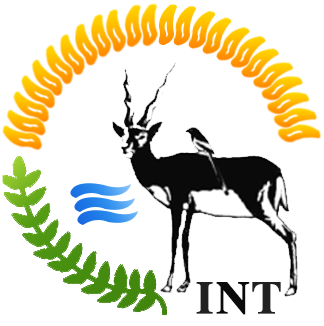
Garden of india
An Insight into the Trip
India by virtue of its varied topography, climate and habitats is very rich in biodiversity resources starting from cold desert to the tropical littoral forests. It is also rich in its folk and traditional knowledge of properties and uses of these resources. Biodiversity resources are valued directly such as food for human, fodder for animals, energy source as fuel, nutrients like leaf manure and structural materials like pharmaceuticals, fibre, fragrances, flavours, dyes and other materials of special interest.
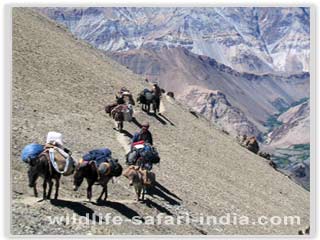
Himalayas
In India, the diversity of plant species, within the species and habitats are very remarkable. A record of India's plant wealth indicates that there are approximately 17500 species of angiosperms, 48 species of gymnosperms, 1200 species of ferns, 6500 species of algae, 14500 species of fungi, 2500 species of lichens, 845 species of liverworts and 1980 species of mosses.
India has 47,000 species of the flowering and non-flowering plants representing about 12 % of the recorded world's flora. Out of 47,000 species of plants, 5150 are endemic and 2,532 species are found in the Himalayas and the adjoining regions and 1,782 in the peninsular India. Areas rich in endemism are north-eastern India, the southern parts of peninsular India, the Western Ghats and the north-western and eastern Himalaya.
India is one of the twelve megadiversity countries in the world with a ranking of tenth in the world and fourth in Asia in plant diversity. Among the 18 hot spots in the world, two are found in India i.e. The Western Ghats and the Eastern Himalayas. Together they have a very high percentage of endemic species of both flora and fauna.
Through the sketch itineraries mentioned herewith we have tried to provide in depth exposure to people interested in flora and fauna of India.
Tea Gardens of India tour
An Insight into the Trip
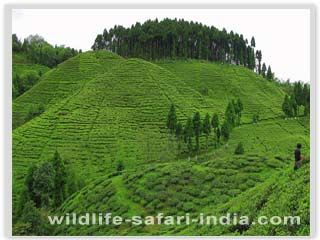
Tea Garden, Darjeeling
According to records, the first commercial tea gardens planted out by the British tea interests were Tukvar, Steinthal and Aloobari tea estates. This was in 1852 and all these plantations used seeds that were raised in the government nurseries.
Darjeeling Tea has come a long way since then and is now appreciated worldwide as hallmark of authenticity, purity and quality. It is not just a tea- A philosophy, tradition, knowledge and way of life- practiced and followed by generations through the ages.
Today there are 86 running gardens producing 'Darjeeling Tea' on a total area of 19,000 hectares. The total production rages from 10 to 11 million kgs annually.
Indian Nature Tours arranges special Tea Tours including overnight halts at the extravagant British heritage Tea Bungalows of Glenburn ,Goomti , Makaibari and Phaskowa tea estates.
Makaibari
Cradled in the lap of the Himalayas, the mystical land of the ancient seers and saints, where the Vedas were created, Makaibari (literally "Maize Land") is in Kurseong, the Land of the White Orchid, in Darjeeling. In 1859, this magical land saw the development of the now fabled tea estate. It went on to become the best tea garden in the world. But not just that.. Tropical rainforests and temperate forests merge in a short span of 35 kms from Siliguri to Kurseong and onward, another 35 km to Darjeeling. Within the boundaries of Makaibari, the diversity of flora and fauna is astounding. Enter Chungey, the dream plot of Makaibari, and the chirping birds, rustling leaves, rumblings of a distant waterfall greet you.
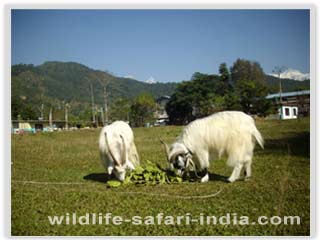
Himalaya Goat, Makaibari
There is a dense forest in Makaibari whose secrets have been scouted by few. There is a huge piece of fossil with the impression of an elephant's foot imprinted. How many thousand years old it is no one knows. Over the four generations, barring the current one, attempts have been made to lift the stone, but none has been able to do so. Rajah Banerjee, of course, would not dream of doing anything to disturb nature. So it is there for people to see.
Snakes, monkeys, rabbits, leopards, Himalayan goats and pheasants, seven natural springs of Himalayan mineral water which originate in Makaibari and give it all the water it consumes....it is an ecotourist's dream. In some places the incline of the land is close to 80 degrees and Rajah Banerjee had taken up the challenge of growing and plucking tea from there. The Makaibari community has done it! Try scaling those inclines, and see the scars of landslides, the flesh of the forest ripped out due to deforestation, on the opposite sides of Makaibari in lands belonging to other gardens. You'll feel the difference.
Glenburn
.a world of fine traditions...
Started by a Scottish tea company in 1860, Glenburn has now passed into the hands of one of India's pioneering tea planting families The Prakashes, who have over the years come to be known as the "Chaiwala family" which literally means "tea planters".
The story of the Chaiwala family began over a hundred years ago, and is closely
entwined with that of tea
plantations in India. Today, the third and fourth generation Prakash family, carry almost a century of tea knowledge in their inheritance, and invite you to visit Glenburn.
..and spectacular scenery...
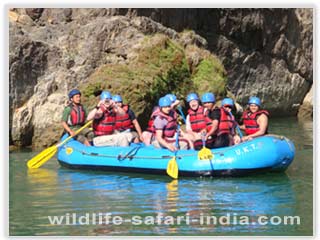
River Rafting
Glenburn a name that literally describes what this 1,600 acre estate is a river valley. With breathtaking views of the Kanchenjunga Mountain Range, Glenburn stretches from an elevation of 3,700 feet, all the way down to the sandy banks of the two snow-fed Himalayan rivers that meander through it The Rungeet and The Rung Dung.
Apart from the sprawling tea fields, Glenburn have forests which are a bird watcher and hiker's paradise. Across the river lie the forests and villages of the old royal kingdom of Sikkim, which you can access via a hanging bridge.
..as well as fun and adventure..
Camp out, river raft, hike through the forest, wander around Darjeeling Town, explore the estate in a four-wheel drive vehicle, or simply take in the sun! Visit The Glenburn Campsite for a picnic, barbeque or an overnight stay at The Glenburn Lodge, by the river Rungeet. With acres of beautiful forests to explore, riverside and other in-house activities, and Darjeeling and Sikkim on our doorstep, a week at Glenburn could be truly relaxing, or action-packed with adventure.
And to complete your Glenburn Experience, learn about the fascinating process of tea making. From bush to factory - and into your tea cup at a tasting session, discover what goes into making a fine Darjeeling tea.
Phaskowa
Phaskowa Tea Estate stretches 650 acres from Buxa Tiger Reserve to River Rydak. The unique experience of the wildlife sanctuaries, Sub-Himalayan treks, acres of tea plantations and your stay at the old colonial Raj era Bungalow will be the memories to cherish lifetime.
Plantation was started by the British tea company, Duncan Brothers in 1897 as an out division of Newlands Tea Estate. Phaskowa Tea Estate was passed into the hands of the Chamarias, the present owners in 1967.
This sprawling 660 acres of tea plantation stretches from Buxa Tiger Reserve on the east all the way to the banks of river Rydak that separates Bhutan from India. It now produces one of the best quality CTC and ORTHODOX teas in Dooars under the loving care of the owners and the dynamism of the present generation. The Chamaria family has been in tea for the last three generations and Mr. C.L. Chamaria
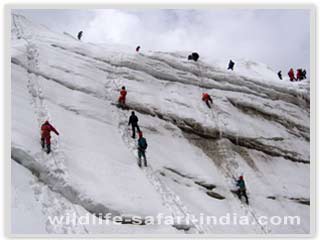
Himalaya Trekking
The patriarch of the family is considered an authority in the Tea business having written many books on the subject. Phaskowa has been their home for more than three decades and now they invite you to come and share the joy and solace this place has given them.
Phaskowa Tea Estate has forests that are a bird watcher's paradise and it is also the natural home of the Asiatic Elephant. You may witness a herd of elephants strolling down the mountains or even catch a glimpse of the Royal Bengal Tiger or a leopard at the Buxa Tiger Reserve. The endangered "One-Horned Asian Rhino" can be seen at Jaldapara and Gorumara and the chirping and whistling of unknown birds can be heard at Rashikbill Bird Sanctuary.
Rivers & streams, gushing and gurgling down the hills meet you at every mile or two. Here, the flora and the fauna break all records of biodiversity and in between these virgin forests are the settlements of small tribes like Mech, Rava, Oraon, Munda, Kora etc. and even the smallest surviving tribe, the Toto.
Besides the experience of wildlife sanctuaries and national parks, you can experience Raja Bhatkhawa Museum of Nature Integration, Sub-Himalayan treks, or simply lie back and relax at the bungalow and let your soul soak in the nature's splendor.
Detailed Itinerary of This Tour
Day 1 : Delhi - Bagdogra / Makaibari
Tea Estate in the Kursheong Hills Check in to Tea Garden Bungalow.
Overnight at Bungalow.
Makaibari is one of the best bio-dynamic tea estate in the world and the
garden has undertaken exemplary conservation initiative to save the flora
and fauna of it's surrounding woodlands and forests. The owner Rajah
Bonnerjee is respected worldwide for his vast knowledge and experience in
Tea. His name was recently recommended for the Green Oscar award.
Day 2: Makaibari Tea Estate Half day Tea Garden & Forest Trails. Understanding Bio-Dynamic Tea Tea processing and grading in Tea Factory.
Overnight at Bungalow..
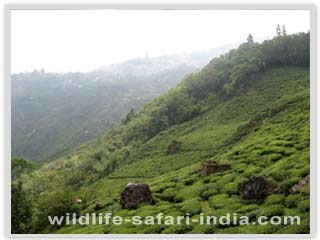
Glenburn Tea Estate
Day 3: Glenburn Tea Estate
Check in to Tea Garden Bungalow.
River side activities and Tea Garden Tour.
Overnight at Bungalow.
Tea and luxury of the Raj era-cannot be better blended than Glenburn. The
great hospitality of the pampering heritage tea bungalow over viewing the
lofty mountains, terraced fields, snow peaks and clouds lacing around the blue
sky is an experience! Glenburn produces finest Orthodox Darjeeling leaf tea.
Day 4 : Darjeeling Tour
Full day sightseeing of Darjeeling.Overnight at Tea Garden Bungalow.
Day 5 : Buxa Tiger Reserve
Transfer to tiger reserve.Overnight at Phanskowa Tea Garden Bungalow.
The only heritage tea bungalow in the Western Dooars. Phaskowa Tea Estate
stretches 650 acres from Buxa Tiger Reserve to River Rydak. The unique
experience of the wildlife sanctuaries, Sub-Himalayan treks, acres of tea
plantations and your stay at the old colonial Raj era Bungalow will be the
memories to cherish lifetime.
Day 6 : Phanskowa Tea Estate
Tea & Forest Tour.
Overnight at Tea Garden Bungalow.
Day 7 :Gurumara National Park
Jungle Safari, visit watchtower. Tribal dance in the evening. Overnight at Gurumara
Jungle Camp.
Day 8 : Delhi
Departure Transfer to Bagdogra Airport for flight to Delhi.
You may also like to see
| SPECIAL
INTEREST TOURS ..................................................................................................................................... Gardens of India : Tea Gardens of India Tour / Orchid Tour of India Tribal Tours of India : Tribal Tour of North East India / Tribal Tour of Manipur Orissa Tribal Tour Spiritual Tours of India : Temple Tour of South India / North India Spiritual Tour South India Spiritual Tour Herpetology ..................................................................................................................................... |
